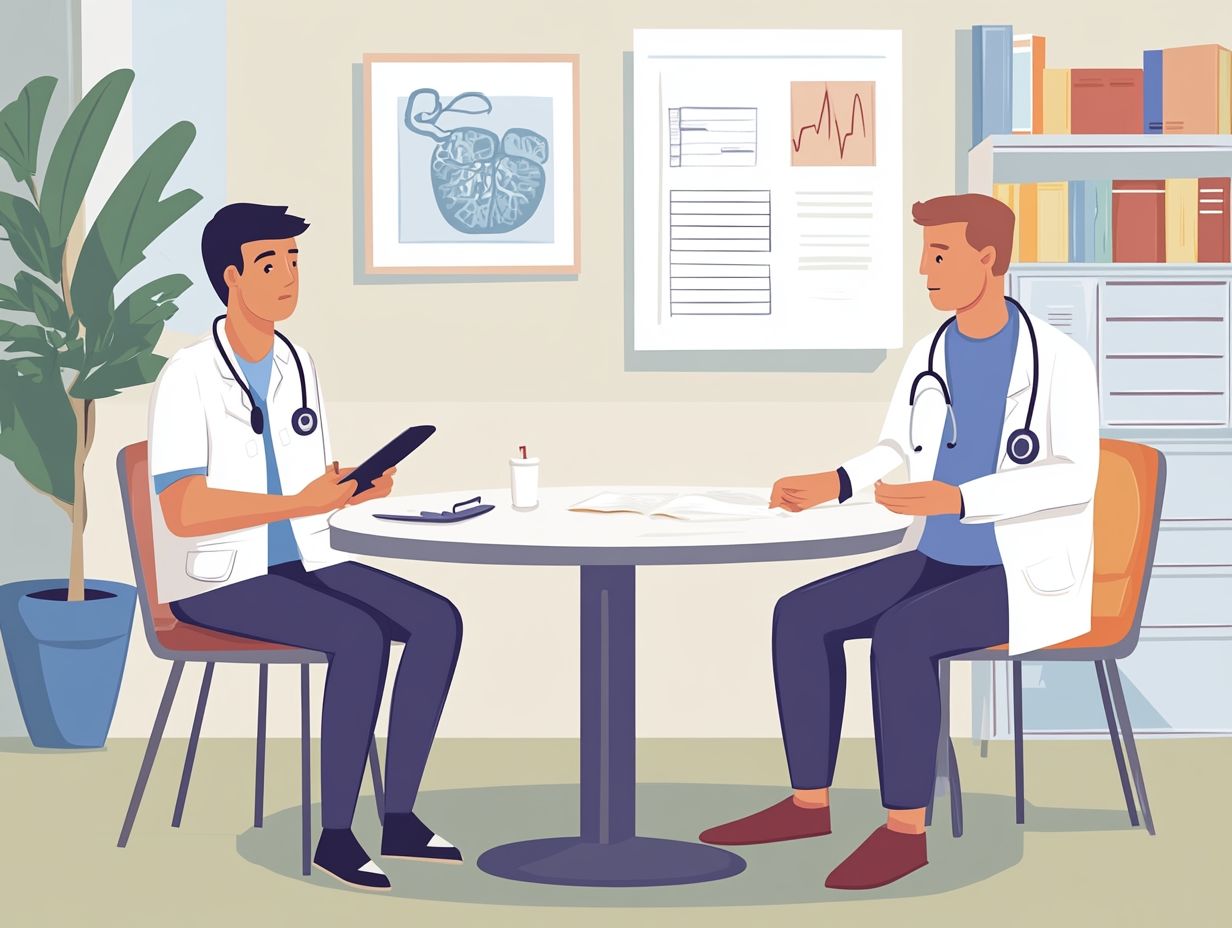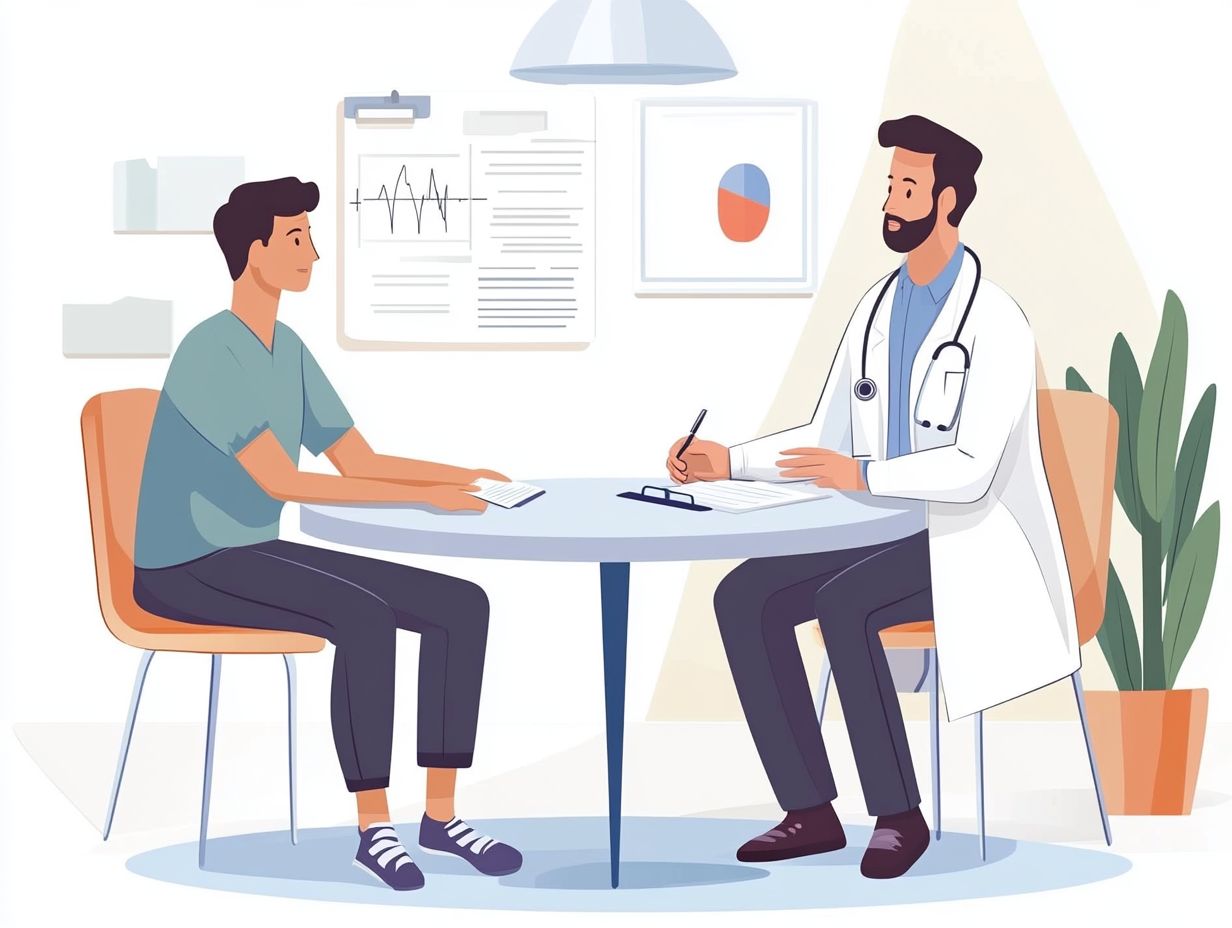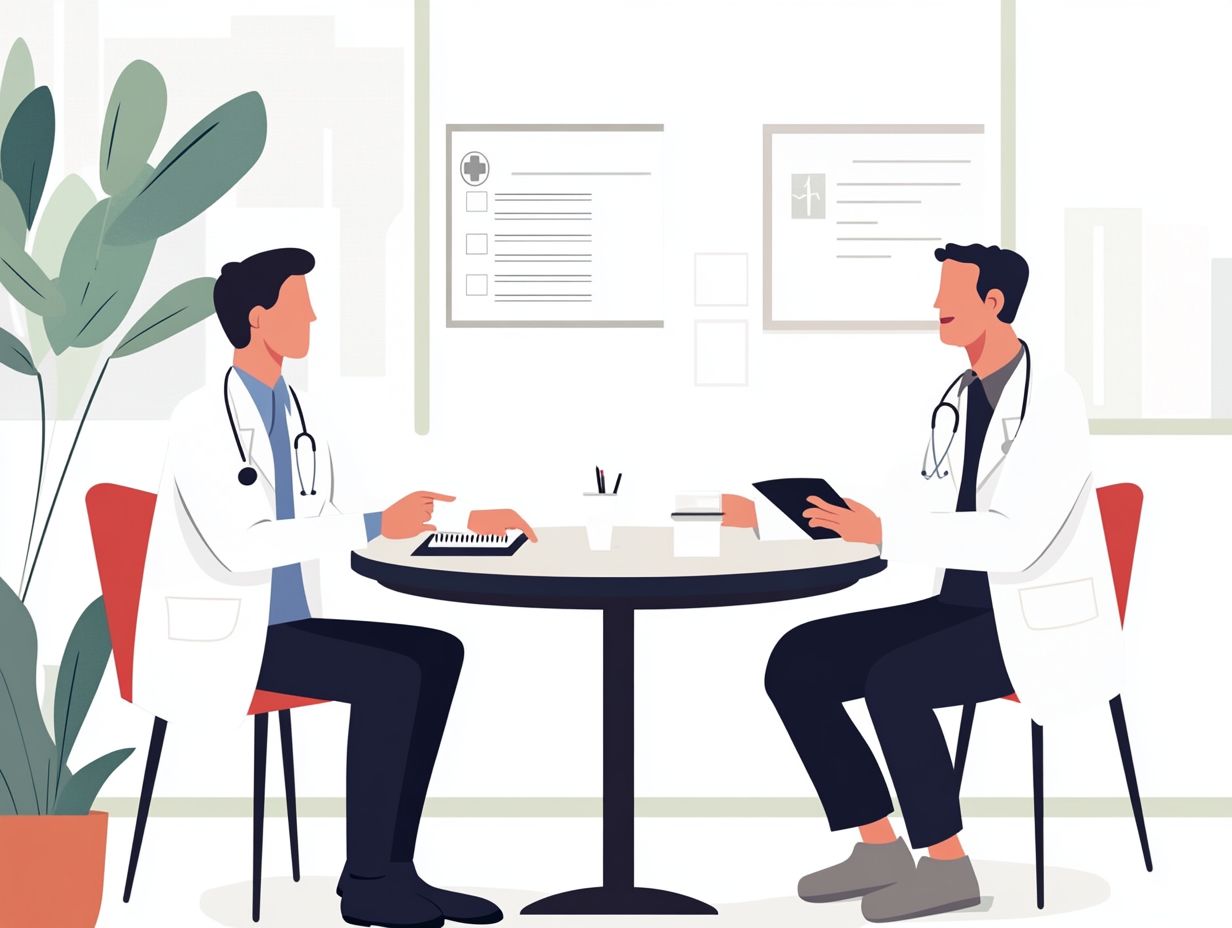Discussing key aspects of your diagnosis and treatment plan with your oncologist, such as the type and stage of cancer, is essential for managing cancer effectively. Ensuring clear communication and understanding can help you navigate this challenging journey with confidence.
Here are five critical topics to discuss with your oncologist:
- Your Treatment Plan: Understand the specifics of your treatment plan, including therapies like chemotherapy, targeted therapy, immunotherapy, and surgery. Knowing the approach helps you prepare mentally and physically for the journey ahead. Discuss both immediate and long-term treatment goals with your oncologist.
- Potential Side Effects of Treatment: Discuss the possible side effects of your treatment, including resistance to therapies and risk stratification, to manage them proactively. Being aware of what to expect can help you mitigate discomfort and seek timely interventions from your care team.
- Your Overall Health and Preexisting Conditions: Your overall health and any preexisting conditions can influence your treatment plan. Providing a complete health history ensures that your oncologist, along with advanced practice providers and physical therapists, tailors the treatment to your specific needs.
- Alternative Treatment Options: Explore alternative treatments such as herbal remedies, acupuncture, and mind-body therapies. Discussing these with your oncologist and the broader care team, including a medical oncologist and a radiation oncologist, ensures they complement your main treatments safely.
- Emotional and Mental Health Support: Addressing your emotional and mental health is vital. Speak with your oncologist about available counseling services, support groups, and social work resources to help manage the psychological impact of cancer. Emotional support from family and friends can also improve your quality of life.
Engaging in these discussions not only enhances your understanding of the treatment process but also empowers you to take an active role in your care. For more detailed questions and personalized advice, always consult with your oncologist or consider seeking a second opinion from other specialists.
Key Takeaways:
1. Your Treatment Plan

A cancer treatment plan is a detailed strategy designed by oncologists to manage and treat cancer based on its type and stage.
The treatment plan includes therapies such as chemotherapy, targeted therapy, and immunotherapy, tailored to the patient’s unique condition.
A cancer treatment plan involves a multidisciplinary care team to ensure comprehensive care and optimize patient outcomes.
2. Potential Side Effects of Treatment
Cancer treatment potential side effects include:
- Nausea, fatigue, and hair loss in chemotherapy;
- Skin irritation and appetite changes in radiation therapy;
- Postoperative discomfort in surgery;
- Resistance to certain therapies.
Patients should report side effects to their oncologist for possible adjustments in the treatment plan.
3. Your Overall Health and Any Preexisting Conditions
Your overall health and preexisting conditions significantly influence your cancer treatment plan.
These factors affect the effectiveness of therapies and the management of side effects.
Stable health can improve tolerance to chemotherapy or radiation, impacting prognosis, recovery, and quality of life.
4. Alternative Treatment Options
Alternative treatment options for cancer include herbal remedies, acupuncture, and mind-body therapies.
Herbal remedies may boost the immune system or alleviate symptoms.
Acupuncture can reduce pain and anxiety, aiding in the overall management of symptoms.
Mind-body therapies like meditation promote mental clarity and relaxation, contributing positively to emotional and psychosocial factors.
Patients should discuss these options with oncologists to ensure they complement traditional treatments and do not interfere with specific treatment options.
5. Emotional and Mental Health Support
Emotional and mental health support are essential in cancer care to address psychosocial factors and behavioral aspects that affect patient well-being and treatment outcomes.
Many healthcare facilities offer professional counseling services and support groups to help patients express feelings and connect with others.
Social work services assist with practical aspects like financial concerns and access to support services, emphasizing the importance of holistic care.
6. Financial Concerns and Resources in Cancer Care
Financial concerns in cancer care include high treatment costs, medication expenses, and additional support services.
Patients often face out-of-pocket expenses, lost income due to time off work, and specialized therapies not fully covered by insurance.
Resources such as financial counseling services and assistance programs can help alleviate financial burdens.
Discussing financial concerns with the healthcare team can reveal insurance options and support networks.
7. Long-Term Effects and Survivorship

The long-term effects of cancer treatment include physical changes like fatigue, pain, and organ dysfunction, as well as psychological impacts such as anxiety, depression, and cognitive challenges.
Cancer survivors should prioritize follow-up care through regular check-ups to identify complications early.
Adopting lifestyle changes, including improved nutrition and exercise, enhances physical endurance and emotional resilience.
A robust support system from friends, family, or specialized groups aids mental well-being and supports comprehensive healing.
8. Managing Symptoms, Pain, and Side Effects
Managing symptoms and pain during cancer treatment involves using medications, physical therapies, and lifestyle changes to improve patient comfort.
Analgesics and adjuvant therapies help alleviate pain, while physical therapies like massages enhance mobility.
Lifestyle changes, such as nutrition and meditation, support overall well-being.
Patients should work with oncologists to adjust treatment plans as symptoms change.
9. Nutrition, Exercise, and Lifestyle Changes Recommendations
Nutrition and exercise are important for cancer patients to support recovery and manage treatment side effects.
Nutrition should include a balanced diet with fruits, vegetables, whole grains, and lean proteins.
Exercise, such as walking or yoga, helps maintain strength and improve mental health.
Cancer patients should consult healthcare professionals for personalized nutrition and exercise plans.
10. Clinical Trials, Experimental Treatments, and Research
Clinical trials and experimental treatments provide cancer patients access to new therapies not available through standard care.
These trials test new drugs and treatment protocols, potentially leading to medical breakthroughs.
Patients should consult with an oncologist to determine the suitability of trials based on health condition and cancer type.
Information on trials is available through registries, hospital networks, and research organizations.
Discussing options with healthcare providers helps ensure understanding of trial implications.
11. Importance of Open Communication
Open communication between cancer patients and oncologists is crucial for tailoring treatment plans and addressing concerns about symptoms or side effects.
Open communication enables patients to ask questions and share treatment experiences, enabling oncologists to make informed decisions and adjust therapies as needed.
Effective communication leads to better health outcomes and a positive patient experience.
12. Support System and Caregiver Involvement
A strong support system including family, friends, and caregivers is critical for cancer patients to manage treatment effectively.
Caregivers provide essential assistance by managing medications and attending appointments, enabling patients to focus on recovery.
Support groups offer emotional support and reduce isolation, improving emotional well-being during cancer treatment.
13. Understanding Test Results and Scans

Understanding test results and scans is essential in cancer care for diagnosing cancer, determining its stage, and evaluating treatment effectiveness.
Diagnostic tools like MRIs, CT scans, and PET scans help visualize tumor size and location, while biopsies reveal cellular characteristics of cancer.
Patients should discuss these results with their oncologist to make informed treatment decisions.
14. Coping with a Cancer Diagnosis
Coping with a cancer diagnosis involves using emotional support systems like counseling, support groups, and community resources to manage feelings and anxieties.
Patients benefit from connecting with others who have similar experiences, which provides a safe environment for sharing and learning coping strategies.
Utilizing mental health services and mindfulness practices enhances emotional well-being and supports the effectiveness of physical treatment.
Prioritizing mental health improves quality of life during treatment.
15. Questions to Ask for Each Stage of Treatment
Questions to ask at the diagnosis stage of cancer treatment:
- What is my exact diagnosis and type of cancer?
- What stage is the cancer?
- What are my treatment options?
Questions to ask before starting treatment:
- What are the goals of treatment?
- What are the potential side effects?
- How will treatment affect my daily life?
Questions to ask during treatment:
- How is my treatment progressing? Are there any imaging tests or biopsies needed?
- Are there ways to manage side effects?
- Should I make any lifestyle changes?
Questions to ask after treatment and during follow-up visits:
- What follow-up care is needed, including managing symptoms and lifestyle changes?
- What are the signs of recurrence, and how can they be detected through imaging tests and biopsies?
- How can I maintain my health post-treatment, including nutrition and physical therapy?
How to Prepare for an Appointment with Your Oncologist?
Preparing for an appointment with your oncologist, including your medical oncologist, involves compiling questions about your diagnosis, stage of cancer, specific treatment options, and side effects, as well as discussing potential care plans and treatment goals.
Gather relevant medical records, test results, including any imaging tests or biopsies, and note any symptoms or changes in health since your last visit to ensure thorough patient care.
This preparation helps ensure your concerns are addressed during the appointment, enhancing your overall patient experience and quality of life.
What Are the Most Important Questions to Ask Your Oncologist?
Most important questions to ask your oncologist, including both your medical and surgical oncologist, include:
- What type of cancer and stage of cancer do I have, including any risk stratification factors?
- What are my treatment options, including chemotherapy, radiation therapy, surgery, targeted therapy, and immunotherapy?
- What are the potential side effects of the treatments, and how can they be managed to improve my quality of life?
- What is the expected outcome of the treatment, including my prognosis and recovery plan?
- Are there support services available, such as support groups, social work counselors, and financial assistance programs?
These questions provide critical understanding and support for your cancer care journey, involving a comprehensive care team, including advanced practice providers and patient access staff.
How Can You Advocate for Yourself During Treatment?
Advocating for yourself during cancer treatment involves actively participating in care decisions, communicating openly with healthcare providers, including your radiation oncologist, and seeking second opinions to ensure your needs and preferences are met.
Self-advocacy includes staying informed about your diagnosis and treatment options, asking questions, understanding psychosocial factors and behavioral aspects, and voicing concerns to tailor treatment to your individual needs, improving patient care and outcomes.
What Are Some Resources for Cancer Patients and Their Families?

Resources for cancer patients and their families include support groups, educational materials on diagnosis and treatment, and financial assistance programs.
Support groups offer a community for sharing experiences and providing emotional support.
Educational materials provide information on conditions, treatment options, and recent research developments in cancer treatment.
Financial assistance programs help reduce financial burdens associated with cancer care, available through major medical centers such as Dana-Farber and MD Anderson Cancer Center.
How Can You Stay Informed and Up-to-Date on Your Treatment Plan?
To stay informed and up-to-date on your cancer treatment plan, communicate regularly with your oncologist to receive updates, ask questions, and discuss any clinical trials or new therapies available.
Review educational materials from reputable sources such as the HMS Office of Communications by Ekaterina Pesheva to understand your treatment options.
Keep informed about recent research developments in cancer treatment to explore new therapies, including targeted therapy and immunotherapy.
Active participation in treatment decisions, including discussing potential resistance to therapies, enhances control and confidence in managing your care.
Frequently Asked Questions
What are the top 5 things to discuss with my oncologist?
The top 5 things to discuss with your oncologist are your diagnosis, treatment options, side effects, prognosis, and any concerns or questions you may have, including discussing any potential need for a second opinion.
What should I ask my oncologist about my diagnosis?
You should ask your oncologist about the type of cancer you have, the stage of your cancer, and any potential risk factors, including behavioral aspects, that may have contributed to your diagnosis.
What treatment options should I discuss with my oncologist?
You should discuss all available treatment options with your oncologist, including chemotherapy, radiation therapy, surgery, and any immunotherapy or targeted therapy options, as well as any relevant clinical trials.
How can I address any concerns or questions with my oncologist?
It is important to communicate openly with your oncologist and express any concerns or questions you may have. Your oncologist, along with your entire care team, is there to help and support you throughout your cancer treatment journey.
What are the potential side effects of my treatment?
Your oncologist can discuss the potential side effects of your treatment and how they can be managed, including both physical and psychosocial aspects. It is important to address any side effects that may arise during treatment to improve your quality of life.
What is my prognosis and how can I prepare for it?
Your oncologist can discuss your prognosis, or the expected outcome of your treatment, with you. They can also provide resources and support, including emotional support and behavioral guidance, for you to prepare for the future.





